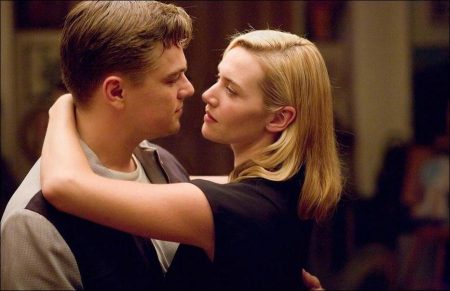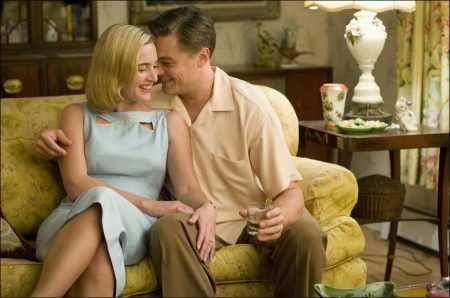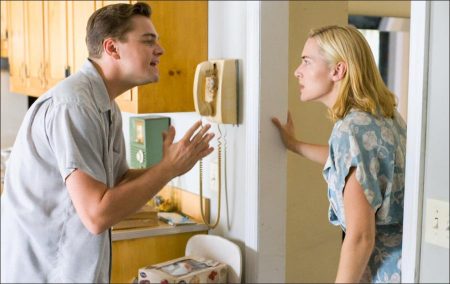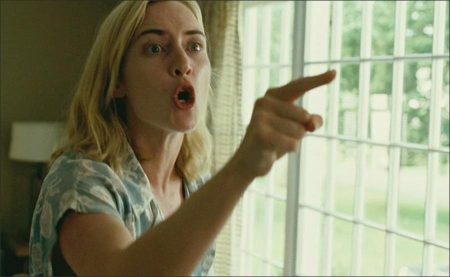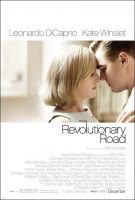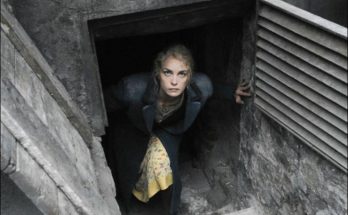Revolutionary Road Movie Trailer. When it came to the look of the film, Sam Mendes wanted at once to evoke Richard Yates’ detailed portrait of a conformist 1955 America while focusing the camera on the timeless marital conflicts of the characters. The idea was to reveal a world that feels different – a vivid realm of well-upholstered but claustrophobic houses; soaring but soulless city office buildings; and martini-filled but uncomforting evenings with the neighbors – yet is just one step removed from our own.
“I didn’t want people to ooh and ahh at the world we created,” comments Mendes. “I wanted to create a window into that period without making a point of it. The most important thing was to have a very real environment in which Frank and April clearly feel lost. I wanted to emphasize a sense of Frank being very, very alone in the city and simultaneously of April being lonely in the house. You have that visual counterpoint throughout the film – Frank in the masses of people and April in the suburbs – which helps to evoke the central themes of the story.”
To accomplish all this, Mendes brought in a highly accomplished artistic team including 7-time Academy Award nominated cinematographer Roger Deakins, Oscar nominated production designer Kristi Zea, and 2-time Oscar winner, and 6-time nominee, Albert Wolsky as costume designer.
Deakins’ main strategy was to shoot with a minimal, bare-bones style, without much lighting equipment, to allow for a deep intimacy to develop between the actors on the set. Mendes was very pleased with how Deakins was able to bring so much lyricism to the most cramped of circumstances. “It was sometimes difficult to watch Roger Deakins, who is one of the great cinematographers, cramming himself into a miniscule kitchen with a huge camera, but I think he really captured the claustrophobia of these interior spaces, from the Wheeler house to the Knox building,” says the director.
Kate Winslet notes that Deakins’ work was also greatly appreciated by the cast. “Roger was incredibly inventive on this shoot because we were mainly shooting in a very, very small house with little natural light and yet he found ways to bounce the light all over,” she says. “He doesn’t use a soft-focus sort of thing – the look is one where you can see every flaw on our faces and I like that. “
Deakins’ photography created a synergistic effect with the design work of Kristi Zea, who has forged some of recent cinema’s most iconic sets, from the back alleys of Goodfellas to Hannibal Lecter’s high-security cell in The Silence of the Lambs.
From the start, Zea collaborated closely with Mendes. “We looked at lots of pictures from the period, creating a visual bible for the film,” she explains. “Sam is amazingly responsive to visual stimuli. I’d put a picture in front of him and he’d say yeah, this is what I think makes sense.”
In addition to the influence of the moody, realist painter Edward Hopper, both Zea and Mendes were drawn to the work of photographer Saul Leiter as a touchstone for the film’s style. With their painterly lushness and emphasis on fragmentation and isolation, Leiter’s street photos of New York City in the 50s and 60s seemed, for Zea, to echo the Wheelers’ story.
The film shot primarily in the Connecticut suburbs with which Yates’ novel is so closely associated. A lengthy search of the Darien area resulted in the ultimate find: two houses, one behind the other, which made the perfect stand-ins for the Wheeler and Campbell abodes. Both houses featured 50s-style architecture affording the production at least a smidgen more square footage. Still, they were tiny by film production standards, which only helped further set the tone. Notes Leonardo DiCaprio: “That location really helped us in feeling claustrophobic and constricted, and added to this feeling that we couldn’t escape.”
Zea completely overhauled both homes, carving out minute personal details for the Wheelers and the Campbells, from their kitchen cabinets to their wallpaper and window dressings. “I felt very strongly that this movie, more than any other that I’ve worked on, should have lots of layers, even to the point of having drawers that open, to allow the actors to really feel like they’re in the part,” she says.
Performance and design were enmeshed throughout. Zea continues: “The Wheeler house in particular mirrors the state of mind of Frank and April. In the beginning you get the sense of them settling in and there’s a very neutral palette. But later, you notice there’s a disintegration, a feeling that the house has been neglected, revealing April’s emotional state.” Zea contrasted the Wheeler house with the Campbell house in every way. “The Campbell house is full of color and knick-knacks, things like figurines and beer steins. It’s really the opposite look,” she points out.
Frank’s personal world is reflected in the Knox Building, the New York City skyscraper where he finds himself suddenly successful in his office job. “For Knox, we were looking for a very classic city building with a sense of almost antique architecture,” Zea explains. “Since Frank’s father worked there before him, we wanted that older feel to it and we were lucky to find the perfect location.”
To fill the film’s houses, apartments and office cubicles, propmaster Tommy Allen scoured the country for a wide range of vintage items, ranging from a `50s lawnmower to authentic `50s lipstick cases. The production also wrangled vintage cars, including Frank’s ’54 Buick and Shep’s station wagon. Period trains were also rounded up from a train museum and hauled to Grand Central Station.
For Zea, one of the most evocative settings in the film is the travel agency where April goes to purchase the all-important tickets for the move to Paris. The sequences were shot in the Cunard Building at 25 Broadway, one of the great classics of New York architecture, and an ode to the powerful dreams travel has represented since it first opened in 1919. “We wanted to create the travel agency as a fantastical space beyond April’s imagination, because Paris is, for her, a ticket to another kind of existence,” explains Zea. “When she goes into that space, she feels like she’s on the threshold of a new life, one that she hopes will relieve she and her husband from their drudgery.”
Like Zea, costume designer Albert Wolsky, who reunites with Sam Mendes for the third time, focused his work on bringing out character. “The clothing establishes the feeling of the New York business world and `50s suburbia and also moves the characters through time and place,” he notes. “You can do this period as more of a fantasy, but we decided to create something very real.”
For Frank Wheeler’s clothing, Wolsky explored the sharply defined dichotomy between work and home life. “At home, he’s very casual, in chinos and a t-shirt, but at Knox, that was an era when the work ethic was that everyone wore a formal suit, hat and tie,” he says. “It was very interesting dressing Leonardo in that way you haven’t seen him before. He really became the period. He looks wonderful in these suits and he went right into it.”
Leonardo DiCaprio as Frank Wheeler
Frank Wheeler is also among the most complex characters in American literature. At 29, he already has many accomplishments: he’s a graduate of Columbia, a combat veteran and working his way up the ladder in his job at Knox. Moored in his times, he makes many of his biggest decisions on the basis of “being a man,” of proving his worth to his friends, neighbors, co-workers and, most especially to April. Yet Frank is also haunted by the desire to not fall into the same trap as his salesman father: that he isn’t anywhere near the man he pretends to be in front of others, that he may not prove to be the talented hot-shot full of potential with whom April fell in love. So when April exposes his contradictions, he is sent reeling. He loves April with all his fragile heart, but as she pushes him to start over and as he pulls back into the life they already know, their paths are wrenched apart.
Though he is a three-time Academy Award nominee for his diverse roles in Edward Zwick’s Blood Diamond, Martin Scorsese’s The Aviator and Lasse Hallstrom’s What’s Eating Gilbert Grape, the film marks the first time Leonardo DiCaprio has played a husband and father. To bring Frank to life would require an ability to simultaneously embody his charisma, his masculine bravado and his terror of failure.
Says screenwriter Justin Haythe: “Leo plays Frank in a way that you can see all his potential and smarts but you also understand that he shares many of our own darker qualities: the way things eat at him, the nature of his underlying anxieties, the way he winds up finding himself becoming his own father.”
For DiCaprio, it was the story’s complexity, both in the novel and the screenplay, that got under his skin. “I’d never read anything like this before about two characters who aren’t heroic, who aren’t victorious at the end of the day, but are just two people desperately trying to make things work,” he says, “and struggling with what they believe their lives should be.”
He was also drawn to the period, as much for what it said about the present as the past. “The `50s era seems so different and bizarre when you look back at it. But at the same time we’ve held onto a lot of the same moral feelings that we still connect with — about what the American dream is, what a family is supposed to do, what the American lifestyle is supposed to be, how a family is supposed to act and react to each other,” DiCaprio observes. “That was the starting point of the moral code we have now.”
DiCaprio was further intrigued by the challenge of peering deep into the complexities of a marriage. “The dynamic between Frank and April is so powerful and realistic, you feel like you’re a fly on the wall watching an intimate relationship disintegrate,” he says. “But you also see that our characters are completely in love and re-energized with each other – until the realities of the life that we’ve chosen creep back in. So it’s a really full psychological portrait of a relationship.”
Most of all, DiCaprio was looking forward to exploring these depths with Kate Winslet. “We’ve been very dear friends for a long time so I felt we could bring something out of the dialogue of these two characters that would be very realistic, very raw and intense,” he says. “I knew we could bring that out in each other and I think she knew it, too. There’s a real trust factor that allows us to push each other. And I’ve never seen an actress who cares as much about making not only her performance better, but everyone’s performance and the movie better, as Kate.”
The process was, DiCaprio confesses, all-enveloping at times. “I’ve never been a part of a film where we talked about and analyzed our characters more,” he says. “A lot of that comes from Sam’s theater experience, his ability to work with actors, his attention to detail in the performances. He really cares about getting to the most accurate portrayal of each character. It can be confrontational at times, and draining, but he has an ability to bring out things in actors that’s truly amazing. Sam’s able to bring out the subconscious voice in each one of the character’s heads and let the audience tap into that.”
Kate Winslet as April Wheeler
April Wheeler is a young, idealistic woman sustained by dreams in a time when women’s dreams rarely saw the light of day. An aspiring actress and a young idealist in New York, she chafes against the narrowness of her role as a Connecticut housewife (despite her love for her family) and, like many women in the late 1950s, yearns to be something more. It is this churning desire that drives April to imagine a new life in Paris, where she will support her husband – in the hopes that he, too, will fulfill his own aspirations and potential in some extraordinary way — and lead a life full of the purpose and satisfaction denied to most of the women she knows. The urge to break away, to break out of the mold, to believe in the future greatness of her husband becomes everything to April – until it is all upended by an unexpected pregnancy. Feeling trapped, her bold steeliness breaks open to reveal a poignant fragility, as she struggles to find a way to restore her happiness with her husband and her bedrock belief in their future.
Playing April is Kate Winslet, whose Academy Award nominated performances have included the young Iris Murdoch in IRIS, the quirky Clementine in Eternal Sunshine of the Spotless Mind and young mother Sarah Pierce in Little Children. This character takes her to new places – portraying a vibrant, vivacious young woman who doesn’t want to compromise, at any cost, her belief that she and her husband are destined for a special life outside the norms of conformity. “Putting Kate, who is this intense, effervescent personality, in the middle of all the restrictions for women in that time, you immediately feel the pathos of April,” says Justin Haythe.
For Mendes, the role seemed an exceptional match for Winslet. He remarks: “She’s always played complex, conflicted characters while retaining their humanity and warmth. So I felt she would be able to walk the tightrope of April and help the audience understand why she does what she does.”
Mendes says the complexities of directing his wife in a story that intimately probes a marriage did give him pause, but he could not turn away from the idea that the material suited both of them. “It’s a very mysterious, difficult role, and because Kate is my wife, I felt I had to be even more sure that she was right – and I was. She is also age-wise exactly what Yates described. So it all sort of aligned and it seemed if there was ever an opportunity for us to work together, this was it.”
Winslet had fallen in love with the novel and Haythe’s screenplay even before her husband knew about it. “I fell in love with the honesty and integrity of it, with its wonderful take on the reality of a marriage,” she explains. “The story is full of characters, who are each trying to figure out who they are and how to be the people they want to be. For me to then be able to make this movie with my husband directing and my friend playing my husband was just a dream.”
Still, Winslet was acutely aware that April would take her into demanding places as the character grasps for an idyllic life that everyone tells her is out of reach. “April is someone who wants so much from life,” she observes. “She isn’t conventional in the way many women were back then. And when she meets Frank, he represents to her the adventure, excitement and this whole beautiful world of intelligent, charmed people she’s been seeking. He’s this intoxicating, talented person who adores her and they embark on this glorious romance,” she says. “But then she gets pregnant and suddenly, she’s a mother and a housewife and it seems that her dreams have been left behind. Yet her desires for herself and her marriage don’t stop there. She can’t bear the thought that this is all that their lives will be.”
This, says Winslet, is what leads April to hatch the plans for Paris – which will ultimately take her and Frank down different paths. “After April suggests Paris it seems to her that they have their relationship back again. They have a sense of purpose,” she explains, “and a whole new lease on life. For those few days, she feels she has herself back, that she can truly have these wild, passionate dreams, which is transformational for her. For the first time in a long time, she feels she is playing a real role in her marriage, outside of the conventional ways that husbands are husbands and wives are wives.”
But all of April’s hopes for Paris and the renewal of her relationship with Frank get derailed when she learns there is another child on the way. As a mother herself, Winslet tried to understand April’s reactions, so rooted in the narrower choices of the era.“She makes choices I would never make as a mother, but what’s tragic about April is that I think if she had the chance to open herself up, to go to Paris and be more free, she would have been a very different mother as a consequence,” she observes.
For Winslet, working on such bracingly honest material while also collaborating for the first time with her husband was a revelation. “I’ve always thought he was an extraordinary director, but it was this piece of him that I really didn’t know, you know? I would hear from other actors that he was so great to work with, and I’d gotten to the point where I really wanted to know what that experience was like. And so doing this movie, it was like the last little bits of him were finally revealed to me.”
Her rapport with DiCaprio also came very organically. “Leo and I have such a strong bond, in part because of the Titanic experience, where we really had to stick together and look after each other.
Having so much support and friendship around her, made a real difference to Winslet as she dove headlong into the role. “I had to throw so much of myself into this part,” she admits. “But it was so fulfilling. To get to portray April, who I’d longed to play since I read the novel, and to see the project all come together in this way, sometimes I couldn’t believe it.”
Kathy Bates as Mrs. Givings
In Revolutionary Road, Frank and April Wheeler are surrounded by neighbors who have their own secret yearnings for a better life. Key among them is Mrs. Givings, the local busybody and realtor who sells the American dream, yet is hiding her own wrenching family crisis. The filmmakers sought after Kathy Bates, an Academy Award winner for her role in Misery and an Oscar nominee for Primary Colors and About Schmidt — and an actress noted for bringing nuanced shadings that illuminate every character she plays.
Says Sam Mendes: “The way Kathy plays her, Mrs. Givings is very funny, but she also breaks your heart. She is someone who wants all of life to be beautifully organized and displayed, and she can’t handle the idea that her son isn’t part of that.”
Bates was immediately attracted to the character. “I was really interested to play Mrs. Givings, because underneath this bright, perky woman who sells homes is a tremendous amount of pain,” she explains. “I also thought the script Justin Haythe wrote stayed very true to the novel – the feeling of the story and the characters absolutely jumped off the page.”
Much as Mrs. Givings longs for a perfect domestic existence, her son John’s mental illness constantly prevents it – which leads to the disastrous dinner scene with the Wheelers. “I think Mrs. Givings lives in a reality removed from the feelings she has for her son,” observes Bates. “She wants to think of him as this brilliant mathematician who’s very impressive and she doesn’t realize how he’s going to shake things up for the Wheelers. Her intentions are in the right place but she’s misguided.”
Bates previously starred with DiCaprio and Winslet in Titanic and was thrilled to work with them again ten years later, being acutely aware of how far they’ve both come “I think Kate is now at the top of her game,” Bates comments. “She’s incredibly seasoned and very thoughtful, always looking for ways to make deeper choices as an actress. It’s also been wonderful to see how Leo has developed his talent and to see the power and the focus of his work in his role as Frank Wheeler.”
Michael Shannon as John Givings
It is John Givings, the mentally ill mathematician, who provides some of the most cataclysmic scenes in Revolutionary Road, as he probes the truth behind the Wheelers’ façade, sensing the tension in their union, questioning their conformity and escapism, and raising provocative questions about the personal costs of “playing house” for each of them.
Says Mendes: “As is often the case in literature, the madman in the story seems to speak the truth. John Givings breaks open the divide between Frank and April.”
Portraying John Givings is Michael Shannon, who is equally known for his stage and film work, having most recently starred in Sidney Lumet’s Before The Devil Knows You’re Dead with Phillip Seymour Hoffman and Ethan Hawke.
Shannon notes that John brings to the fore one of the most fascinating themes in the story. “A lot of times people who read the book think that John is the sanest one of them all, so it raises the issues of which lifestyle is crazy and which isn’t,” points out Shannon. “In order to survive in the world, do you have to be numb or not paying attention or willing to surrender any sense of discovery about life – or must you do the opposite?”
Yet for all of the character’s flashes of insight into Frank and April, Shannon is cautious to not gloss over just how troubled John truly is, for he is a man unable to get anywhere in his own life due to serious delusions. “No matter how much people might relate to what he says, John is truly a damaged person, and that has to come across,” he says.
Right away, Shannon confessed his hopes for the role to Kate Winslet. He recalls: “I told her the first day that I was very nervous because this book and the character really means a lot to me. Both she and Leo are such wonderful actors. It was intimidating, but also very exciting, to work with them.”
DiCaprio was in turn inspired by Shannon. “He brought terrific energy to the part and became this igniting force between Frank and April in an amazing way,” he says. “Everywhere else Frank and April go, nobody is really telling the truth, everybody has the apple pie smile on their face, and everything is glossed over – and John Givings comes in and represents the truth.”
David Harbour and Kathryn Hahn as the Campbells
The Wheelers’ neighbors and closest friends, Shep and Milly Campbell, expose another side of marriage – the social side, in which couples form partnerships with other couples, adding to the complexity. The Campbells clearly admire, even envy, the cool and beautiful Wheelers, yet they also seem to hold up a mirror to them, reflecting back everything the Wheelers don’t want to become. Though the two couples share much in common, Frank and April believe the Campbells, nice as they are, are stuck in a dull, unchanging marriage, unlike their own. Yet, their fates will become increasingly intertwined, especially as Shep loses his deep longing for April.
Says Sam Mendes: “Shep and Milly are one of the most interesting parts of the film for me, because when the Wheelers come along, they feel their friendship gives their lives meaning, makes it glamorous and exciting. It’s a precarious situation, and then Frank and April drop this bombshell: they’re leaving. They’re going to Paris and leaving the life they all share behind. And it basically destroys the Campbells. I love the way Yates takes this small detail and turns it into an earthquake, exploring the way a marriage reverberates through relationships with neighbors, friends and the community.”
Portraying Shep is David Harbour, a Tony Award-nominated actor renowned for his stage work who is also seen starring in the recent James Bond film, Quantum of Solace; and playing Milly is Kathryn Hahn, another star of Broadway who was recently seen with Will Ferrell in the comedy Step Brothers.
Shep Campbell may seem the prototypical suburban husband on the surface, but underneath, in a place he suppresses with all his might, he desires April Wheeler, and all the wild femininity she represents, with an obsessive passion. Says David Harbour: “I think when Shep meets April and Frank, he feels like he’s arrived and he sees April as this ideal of the woman he always dreamed about being with. She is this extraordinary creature who has dropped into his suburban world – the way she moves, the way she speaks, the way she dresses is everything he feels he somehow doesn’t have with Milly.”
Harbour says his portrait was helped by his collaboration with Winslet. “Kate’s strength and intelligence really comes across in April. You see exactly why she would be so attractive to someone like Shep who feels so adrift in his life,” he comments.
Similarly, Kathryn Hahn had a great deal of empathy for Milly Campbell, despite the fact that she is the least outwardly confident person in the foursome, and the one person who seems to have unquestioningly accepted her conventional role. “I like Milly because she’s trying to be the very best wife she can be in a marriage with a man she feels she can never do enough for,” she explains. “She knows that she’s not worldly, classy, sophisticated or anything of those things that April Wheeler is. But she looks at the positive side of it and feels lucky to be the Wheelers’ close friend.”
Hahn sees Milly as representing something beyond the `50s housewife, something that speaks to a feeling still prevalent today. “There is still that fear of being different,” she observes, “that fear of standing out in society and that plays a big part in Milly’s world.” But Hahn also says that her portrait of Milly’s reticence could only work in contrast to Winslet’s portrayal of April’s fearlessness. “Kate brought out the passion and hunger of a housewife who is ripping at the seams,” she summarizes.
Zoe Kazan as Maureen
When Frank Wheeler finds himself frustrated at home, he acts out through an afternoon of infidelity with his secretary – Maureen, an innocent young New Yorker smitten with his power and his manliness in a counterpoint to his wife’s high expectations. To play Maureen, Mendes tapped Zoe Kazan, who at 23 is the same age as the naïve character she plays. The granddaughter of the illustrious film director Elia Kazan, Zoe has done award-winning work in theater and has been making a mark on the big screen.
Like others in the cast, Kazan was taken with Yates’ novel. She says: “To me it’s about the crisis faced by modern men and women as to what their behavior should be like: What are the standards? What are the rules? As for Maureen, she’s alone in the city trying to figure out these rules for herself. There’s a kind of sweetness and innocence to her, but also a very real need for human contact. She acts from the heart and that’s why she is so vulnerable.”
When Frank takes an interest in Maureen, however short-lived, it lights up her world, notes Kazan. “To her, it’s the most romantic, exciting thing that’s ever happened. But to Frank, I think she must look like the softest, easiest pushover in the world, like she would never judge him, or think he’s anything other than the marvelous man he wants to be.”
Revolutionary Road (2009)
Directed by: Sam Mendes
Starring: Leonardo DiCaprio, Kate Winslet, Michael Shannon, Kathryn Hahn, David Harbour, Kathy Bates, Marin Ireland, Jonathan Roumie, Samantha Soule, Maria Rusolo, Gena Oppenheim
Screenplay by: Justin Haythe
Production Design by: Kristi Zea
Cinematography by: Roger Deakins
Film Editing by: Tariq Anwar
Costume Design by: Albert Wolsky
Set DecoratMusic by: Debra Schutt
Art Direction by. Teresa Carriker-Thayer, John Kasarda, Nicholas Lundy
Music by: Thomas Newton
MPAA Rating: R for intense thematic material, drug references, violence, sexuality, language.
Distributed by: Paramount Vantage
Release Date: January 23, 2009
Views: 251
